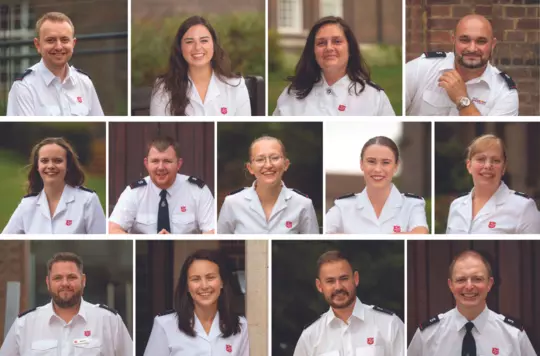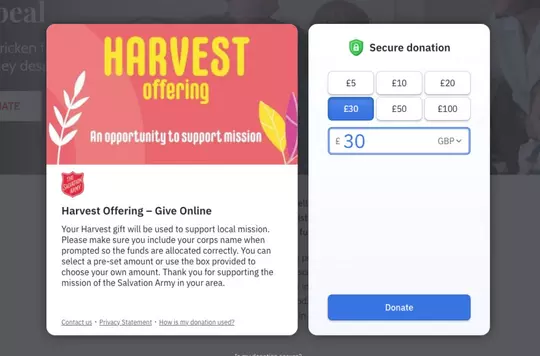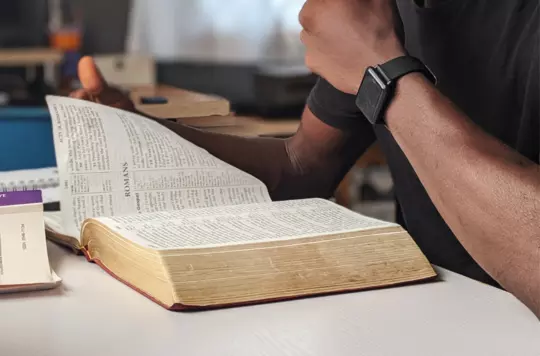10 October 2022
More than enough!
Bible study by Major Marjory Parrott
Major Marjory Parrott highlights Jesus’ provision for more than 5,000 people.
Key text
Recently I discovered Great British Menu on BBC Two and have been busy binge-watching episodes. I was fascinated by the stunning dishes but also amazed at the quantities being cooked, sometimes just to provide a dot of food on the plate.
In our study passage, the emphasis is less on presentation and more on sustenance, to the extent that there are leftovers and yet everyone is full.
Pause and reflect
- In our relationship with God, how ready are we to believe that he provides us with more than enough?
Luke places this miracle after Jesus gave power and authority to his disciples and instructed them how to proceed as they set out to proclaim the good news and heal people everywhere (see Luke 9:6). Matthew (see 14:1–12) and Mark (see 6:14–29) place it after John the Baptist has been beheaded. In John’s Gospel the miracle is placed some time after Jesus healed a man on the Sabbath, thus annoying the religious leaders and provoking a fierce discussion (see John 5).
This is the fourth of the seven ‘signs’ performed by Jesus that John records. It appears that the crowd is more motivated to witness Jesus’ miracles than to listen to his message. Yet, despite the audience’s inferior motives, Jesus still meets their need.
Sometimes we struggle because we long to see people become Christians, yet they just want their physical needs met. When we want their spiritual hunger to be met and they seem unaware of their need, it is hard not to become discouraged. It is also a challenge not to be sidetracked and focus solely on meeting physical needs.
In this incident, Jesus teaches us patience. If he could be patient and meet people where they were, knowing that his time was limited, then surely we can do the same.
We know that Jesus’ ministry was neither solely practical nor purely preaching the good news, but he also had the wisdom to know what to provide and when.
Pause and reflect
- Do you feel that your Christian service is one-sided?
- How can you address that?
- Whose help do you need?
Jesus already knew how to fix the situation (see v6) but he still challenged the disciples to find the solution. This is generally not what we expect from our relationship with God. If we are honest with ourselves, we expect that we will ask the questions and God will provide the solutions. Nevertheless, God wants to enable and encourage each of us. A good way for this to happen is if we become instrumental in finding the solution.
As the miracle unfolds, we see that God does not expect the disciples to work things out all by themselves. Likewise, when we have suggested a way ahead, we need his blessing and help to progress.
Pause and reflect
- In your relationship with God, how easy do you find it to be the one providing possible solutions, rather than the one outlining the problem?
- Why is that?
A fellow officer frequently issued the challenge to notice who isn’t at the table – that is, who isn’t included in our churches and activities.
It has taken me years to notice who isn’t at the table in this reading. Although Matthew notes that there were women and children present, it is almost an afterthought (see Matthew 14:21) and the other Gospels focus simply on the men. In this case, others are present but they don’t count.
We all need to be inclusive and welcoming, ensuring everyone belongs. When we are so comfortable being with others who are like us that we exclude those who aren’t – even accidentally – we need to not only ask God to give us eyes to see what’s happening but also seek his forgiveness.
In our study passage, it is a child – one of those who ‘don’t count’ – who provides what is needed in the form of his packed lunch.
Pause and reflect
- Who is present in your community yet missing from your corps?
- Who is present in your corps yet goes unnoticed?
When watching Great British Menu, I sometimes wonder what happens to the leftover food. Although we are told the quantity of food left over from this miracle in our study passage, we are not told what happens to it. I would like to think that Jesus had a purpose for the leftovers.
This story is a lesson in stewardship, in ensuring that nothing is wasted and a reminder that God is no one’s debtor. Even when we struggle to believe it, God’s provision for us is always more than enough.
Bible study by

Major Marjory Parrott
Corps Officer, Swadlincote
Discover more

Members of the newest session of cadets share their stories as they begin officer training.

Find out how you can stand in solidarity with survivors this Anti-Slavery Day (18 October) and beyond.

As corps celebrate Harvest, Hannah Kingston reminds Salvationists that they can give their offering online.

